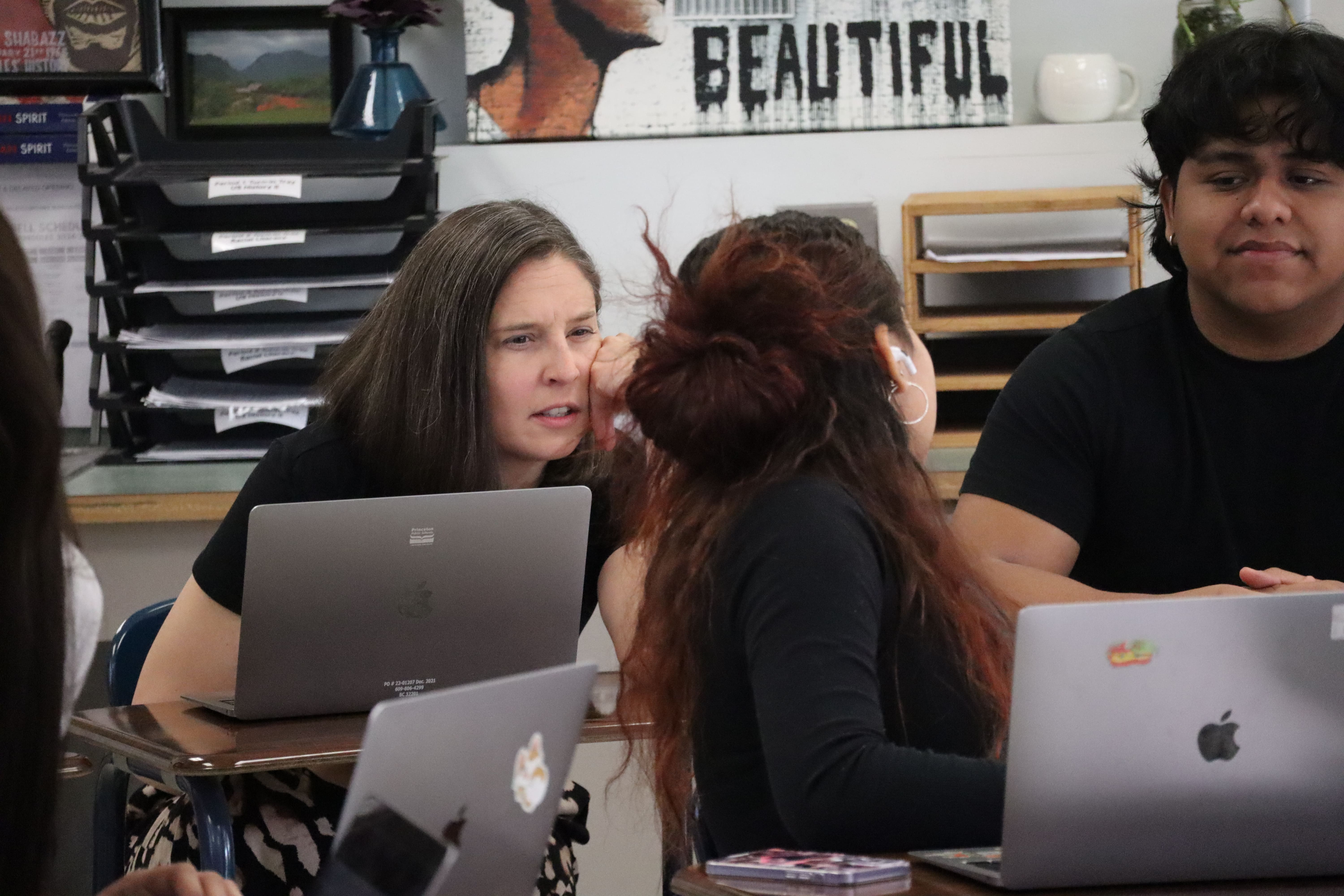PHS reacts to federal crackdown on DEI in K-12 education
April, 2025
Photo: Katherine Chen
Patricia Manhart (left) discusses with her PHS racial literacy students Jennifer Lopez de la Cruz ’26 (center) and Anuar Viruel Lopez ’25 (right).
On February 27, the Trump administration launched an “end-DEI” portal that allows anyone to report illegal diversity, equity, and inclusion (DEI) practices in the classroom. Then, on April 3, the Department of Education sent a letter that threatened to withhold federal funding for districts that do not end “illegal DEI practices.” Finally, on April 22, the Supreme Court heard arguments about whether elementary schools can compel students to be present for lessons that discuss LGBTQ characters.
This rapid sequence of initiatives that aim to eliminate DEI programs in education have left administrators, educators, and students across the country — including at PHS — questioning what exactly qualifies as an illegal DEI practice, whether they can continue discussing DEI-related topics, and what might come next.
“The goal is to chill speech. It’s to chill conversation about diversity, equity and inclusion, and it’s very frustrating,” said Kimberly Tew, assistant superintendent of curriculum and instruction for Princeton Public Schools (PPS). “Talking with teachers, they’re like, ‘Can I still do this lesson? Can I talk about — you know — maybe they’re a cisgender woman married to a woman, right — can I talk about my family?’ There’s a lot of concern about these things.”
The federal government does not have the right to determine the curriculum in public schools, a power reserved to the states according to the 10th amendment. However, the federal government does fund around 15 percent of total public school spending — which is its primary leverage in enforcing new DEI policies.
New Jersey mandates the teaching of diversity, equity, and inclusion in public schools, including a mandate to teach LGBTQ history, African American history, and Asian American & Pacific Islander history. It’s not immediately clear whether these mandates are “illegal DEI practices” according to the federal government, which has left districts unsure whether they are at risk of federal funding cuts.
“[Though] the U.S. Department of Education’s request references “certain DEI practices” or “illegal DEI,” it does not define those terms, and there are no known federal or New Jersey State laws prohibiting diversity, equity, or inclusion,” wrote Kevin Dehmer, NJ’s education commissioner, in response to a letter from the Trump administration.
PPS receives only 2 percent of its budget from the federal government (most comes from local property taxes), which means that it is much less beholden to federal funding policies compared to most other districts nationally.
“The district embarked upon an equity initiative starting in about 2018, and since then, we have done a lot of work, both in and outside the curriculum arena, to make this building more equitable. That’s something we’re proud of, [and] we will not change that,” said PHS Principal Cecilia Birge. PPS administrators are instead concerned with what might happen to NJ education policy. In 2024, NJ experienced the second largest shift to the right nationally.
“You know, my bigger concern is at the state level — who’s coming into the new governor’s office this year, what the State Assembly and Senate look like. Those bodies have much more say about what happens at the school level than the federal government,” said Tew.
However, for now, some PHS teachers are using the crackdown on DEI as a way to educate their students about issues like censorship, historiography, and systemic racism.
“We’re trying to help students understand that it’s part of trying to cut out or cover up different parts of history — we’re noting current events where things like a page about Harriet Tubman on like government websites might be taken down, or [the government websites] on the Stonewall Rebellion are dropping the T of LGBT,” said Patricia Manhart, who teaches PHS racial literacy.
“We’re trying to get students to understand that the attack is really just an attack on accomplishments by people of color throughout United States history, as well as [a] cover up the legacy of racial inequality that is also very real.”
PHS students have also expressed concerns over the efforts to eliminate DEI, especially concerning the effects it would have on their future educational environments.
“I’ve personally talked to minorities about the topic, and they definitely hold more pessimistic ideas about their own futures, and that’s something I can relate to,” said Jasmine Taylor ’26, a student in the Racial Literacy class at PHS. “It kind of made me feel a lot more pessimistic about college, because I feel like they’re not taking into account very nuanced topics [anymore].”